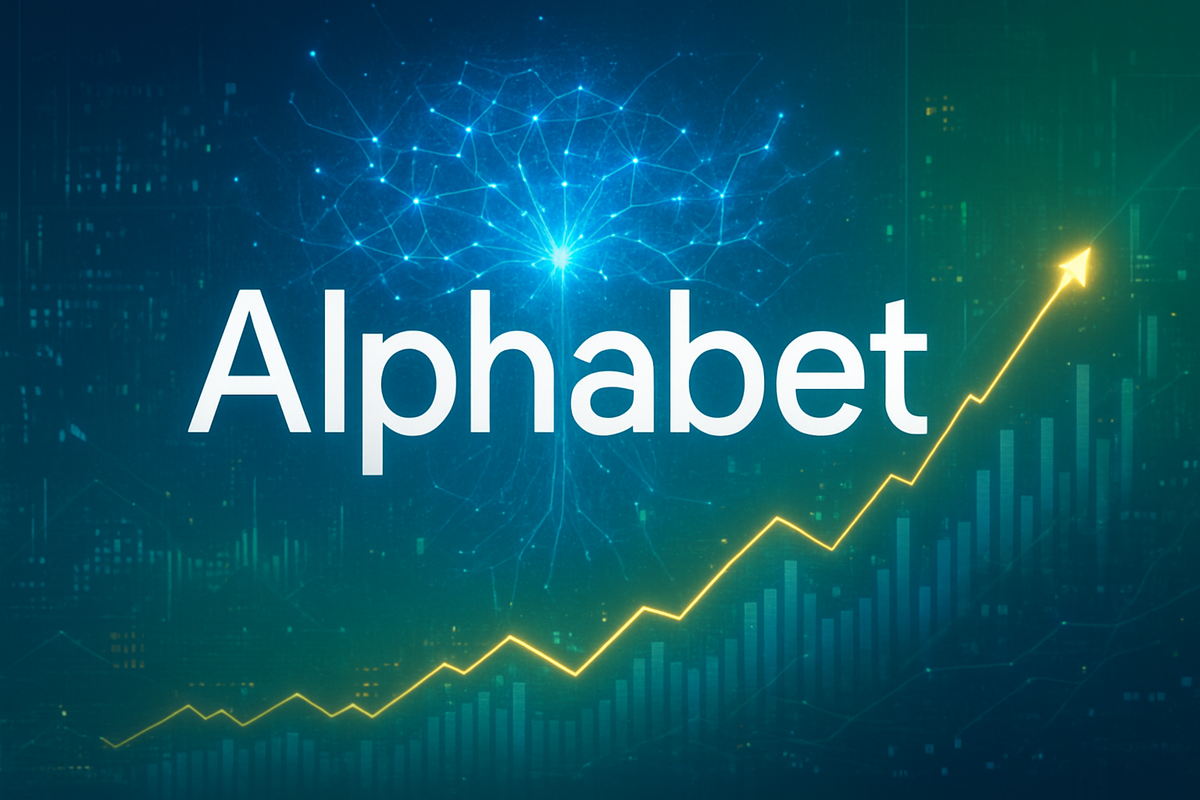
Alphabet (NASDAQ: GOOGL) has emerged as a dominant force, unequivocally leading the charge in the stock market's recent artificial intelligence (AI) trade comeback. As of late 2025, the tech giant's strategic advancements and successful monetization of its AI initiatives have not only propelled its own valuation to unprecedented heights but have also reignited investor confidence across the broader technology sector. This resurgence signifies a pivotal moment, dispelling earlier skepticism about Alphabet's competitive standing in the rapidly evolving AI landscape and positioning it as a key driver of market momentum.
The immediate implications of Alphabet's AI-driven performance are profound, ranging from a substantial surge in its stock price and market capitalization to a renewed sense of optimism among investors. With its Class A shares (NASDAQ: GOOGL) nearing a $4 trillion valuation and outperforming many of its "Magnificent 7" peers, Alphabet's integrated AI ecosystem—encompassing custom chips, advanced models like Gemini 3, and vast distribution channels—is proving to be a powerful engine for growth. This robust showing is not merely a testament to technological prowess but also a clear signal of AI's transformative potential to generate significant commercial value across diverse sectors.
The Genesis of a Comeback: Alphabet's AI Trajectory
Alphabet's journey to leading the current AI trade comeback is a story of persistent innovation, strategic pivots, and robust execution, culminating in a series of significant milestones in 2025.
A major catalyst for this resurgence was the highly anticipated launch of Gemini 3, Alphabet's most sophisticated AI model to date. Unveiled earlier in 2025, Gemini 3 has been seamlessly integrated across Google's core services, including its ubiquitous Search engine and the enterprise-focused Vertex AI platform. This new iteration has garnered critical acclaim for its enhanced reasoning capabilities, advanced coding prowess, and multimodal understanding, setting a new industry benchmark. Analysts and tech enthusiasts alike have lauded Gemini 3 as a direct and formidable competitor to offerings from rivals like OpenAI, effectively reinvigorating Google's narrative in the intensely competitive AI race. The integration of "AI Overviews" in Google Search, now reaching over 2 billion monthly users, alongside the introduction of "AI Mode," has made search more intuitive and commercially valuable, opening new avenues for advertising revenue growth.
The timeline leading up to this moment reflects a deliberate and accelerated strategy. Following initial concerns in late 2022 and early 2023 that Google might be lagging in the generative AI space, the company embarked on an aggressive roadmap. This included significant internal restructuring, increased investment in AI talent and infrastructure, and a focused effort to bring its foundational AI research to market at an unprecedented pace. Key players involved in this strategic push include CEO Sundar Pichai, who has consistently emphasized AI as the future of Google, and the leadership teams within Google DeepMind and Google Cloud, who have been instrumental in developing and deploying these advanced AI solutions.
Initial market reactions have been overwhelmingly positive. Alphabet's stock (NASDAQ: GOOGL) has seen a substantial rally, reaching new all-time highs and demonstrating a clear re-rating by investors who now view the company as a frontrunner in the AI revolution. On November 24, 2025, Class A shares surged in pre-market trading, reflecting heightened investor confidence. This sentiment is further bolstered by strong financial results, with Google Cloud reporting a robust 34% year-over-year revenue increase, largely driven by demand for its AI infrastructure and analytics tools. The disclosure of a multi-billion dollar stake by Berkshire Hathaway (NYSE: BRK.A, BRK.B) in Q3 2025 further underscores institutional endorsement of Alphabet's AI strategy, signaling a strong belief in its long-term potential. The market's initial skepticism has given way to widespread recognition of Alphabet's unique position as a vertically integrated AI powerhouse, controlling everything from custom-designed AI chips (TPUs) to advanced models and extensive distribution channels.
The Shifting Sands: Identifying Winners and Losers in the AI Era
Alphabet's (NASDAQ: GOOGL) commanding lead in the AI trade comeback is reshaping the competitive landscape, creating clear beneficiaries and posing significant challenges for others. The ripple effects of its innovation and substantial investment are felt across the technology ecosystem, from chip manufacturers to cloud service providers and even traditional industries.
Unsurprisingly, Alphabet (NASDAQ: GOOGL) itself stands as the primary winner. Its stock performance in 2025 has been stellar, driven by the successful integration of its Gemini AI models into core products like Search, Gmail, and Android. The robust growth of Google Cloud, fueled by enterprise adoption of AI offerings such as Vertex AI, underscores its ability to monetize AI effectively. Alphabet's vertically integrated strategy, leveraging its custom Tensor Processing Units (TPUs), provides a structural cost advantage and efficiency, reducing its reliance on third-party hardware for extensive AI workloads. The company's commitment to sustained AI-driven growth is evident in its significantly increased capital expenditures for 2025, primarily allocated to AI and cloud infrastructure.
Beyond Alphabet, several companies providing the foundational AI infrastructure are poised for substantial gains. Nvidia (NASDAQ: NVDA), despite Alphabet's focus on TPUs, remains the undisputed leader in AI Graphics Processing Units (GPUs), essential for large-scale AI training and inference across the industry. Alphabet's overall AI spending indirectly contributes to Nvidia's robust position. Similarly, Broadcom (NASDAQ: AVGO) benefits from supplying high-speed networking chips and custom AI accelerators critical for connecting massive AI clusters. Companies specializing in networking equipment and data center infrastructure, such as Arista Networks (NYSE: ANET), Equinix (NASDAQ: EQIX), and Digital Realty Trust (NYSE: DLR), are experiencing increased demand for their robust networks and specialized real estate to house AI servers. Super Micro Computer (NASDAQ: SMCI), a provider of optimized server racks and cooling systems for AI workloads, is also a clear beneficiary. Even Advanced Micro Devices (NASDAQ: AMD), as a competitor in the GPU market, stands to gain from the overall surge in demand for AI accelerators. Strategic partners like Foxconn (TPE: HNHPF), collaborating with Alphabet's robotics subsidiary Intrinsic, are streamlining supply chains and automating manufacturing through AI, further cementing their role in the advanced manufacturing sector. Furthermore, Berkshire Hathaway (NYSE: BRK.A, BRK.B)'s multi-billion dollar investment in Alphabet signals strong institutional confidence in its AI trajectory.
However, Alphabet's ascendancy also presents significant challenges for direct competitors and those slow to adapt. While Microsoft (NASDAQ: MSFT), with its substantial investment in OpenAI and its Azure cloud services, remains a formidable player, the perceived parity or even superiority of Gemini 3 has intensified pressure on OpenAI to innovate and on Microsoft to maintain its competitive edge in the cloud AI space. Amazon (NASDAQ: AMZN)'s AWS also faces heightened competition from Google Cloud, especially as Google leverages its AI expertise and custom TPUs to differentiate its offerings, with Google Cloud projected to outgrow AWS through 2027. Smaller AI startups and research institutions may find it increasingly difficult to compete with the rapid pace of innovation and the vast resources commanded by tech giants like Alphabet. Moreover, traditional search and advertising businesses that fail to integrate AI effectively into their models could see market share erode as Google's AI Overviews and AI Mode transform the user experience. Ultimately, companies that haven't invested sufficiently in developing their own AI capabilities or securing access to advanced AI infrastructure risk being left behind in this new, AI-driven economy.
Wider Significance: Reshaping Industries and Policy
Alphabet's (NASDAQ: GOOGL) leadership in the AI trade comeback transcends mere stock performance; it signifies a profound shift in broader industry trends, with potential ripple effects across competitors, partners, and the regulatory landscape. This moment echoes historical technological transitions, offering valuable insights into the future trajectory of innovation and market dominance.
This event fits squarely into the broader industry trend of AI democratization and integration. What was once confined to research labs is now becoming deeply embedded in everyday products and enterprise solutions. Alphabet's success with Gemini 3 demonstrates that advanced AI models are not just powerful tools but also critical components for enhancing existing services and creating entirely new user experiences. This pushes the entire tech industry to accelerate their AI strategies, forcing every company to consider how AI will transform their offerings or risk obsolescence. The emphasis on vertical integration, from custom chips (TPUs) to end-user applications, also highlights a trend towards greater control over the AI stack, potentially leading to more efficient and cost-effective solutions for the dominant players.
The ripple effects on competitors are substantial. Companies like Microsoft (NASDAQ: MSFT), with its OpenAI partnership, and Amazon (NASDAQ: AMZN), with AWS and its own AI initiatives, are now under increased pressure to innovate faster and demonstrate clearer pathways to AI monetization. The intense competition among these hyperscalers for AI talent, compute resources, and enterprise clients is driving unprecedented levels of capital expenditure across the industry. For partners, particularly those in the Google Cloud ecosystem or those leveraging Google's AI APIs, this means access to cutting-edge tools and increased opportunities for integration and co-innovation. However, it also means a greater reliance on Alphabet's technological roadmap.
Regulatory and policy implications are also coming into sharper focus. As AI becomes more powerful and pervasive, governments worldwide are grappling with issues such surrounding data privacy, algorithmic bias, intellectual property, and the ethical use of AI. Alphabet's prominent role will likely draw increased scrutiny, potentially leading to calls for more stringent regulations on AI development and deployment, especially concerning large language models and their impact on information dissemination. Discussions around AI safety, transparency, and accountability are expected to intensify, potentially influencing how companies like Alphabet develop and deploy future AI iterations. The sheer scale of Alphabet's AI capabilities could also raise antitrust concerns, particularly if its dominance in AI translates into unfair competitive advantages in other markets.
Historically, this moment bears resemblance to past technological revolutions, such as the rise of the internet in the late 1990s or the mobile computing boom of the late 2000s. In each instance, a few key players emerged as leaders, driving innovation and capturing significant market share. Just as Microsoft (NASDAQ: MSFT) dominated the PC software era and Apple (NASDAQ: AAPL) revolutionized mobile, Alphabet's current position in AI suggests it could be a defining force in this new technological paradigm. The rapid pace of innovation and the winner-take-most dynamics observed in previous tech cycles are highly relevant here, suggesting that early leadership in foundational AI technologies can translate into long-term competitive advantages.
The Road Ahead: Navigating AI's Future with Alphabet at the Helm
Alphabet's (NASDAQ: GOOGL) current dominance in the AI trade comeback marks not an endpoint, but a significant inflection point, setting the stage for a dynamic future filled with both immense opportunities and formidable challenges. The company's "AI-first" strategy, championed by CEO Sundar Pichai, is poised to drive substantial short-term integration and long-term transformation across its vast ecosystem and beyond.
In the short term, over the next one to two years, Alphabet is expected to aggressively deepen the integration of its advanced AI models, particularly Gemini Ultra 2.0 and Gemini 3, across its entire product portfolio. This includes enhancing Google Cloud offerings and further revolutionizing Google Search with features like AI Overviews, which are already reaching over 2 billion users and showing promising monetization rates. The rapid growth of AI Mode, with 75 million daily active users, underscores the immediate user adoption. To support this ambitious rollout, Alphabet is committing staggering capital expenditures, projected at $91-93 billion for 2025, primarily dedicated to expanding AI infrastructure, including next-generation data centers and the deployment of both NVIDIA's (NASDAQ: NVDA) Blackwell GPUs and its own custom Ironwood Tensor Processing Units (TPUs). This investment is expected to fuel continued robust growth in Google Cloud, which saw a 34% revenue surge in Q3 2025, driven by sustained enterprise demand for AI infrastructure.
Looking further ahead, over the next three to five years, Alphabet's long-term possibilities are even more transformative. The vision extends to developing entirely new AI-powered products and services that are currently unconceived, potentially opening up entirely new markets. Multimodal and "agentic" AI, capable of understanding complex queries and proactively completing tasks across various Google services like Calendar, Gmail, and Maps, is a key strategic focus. Analysts project AI Overviews to evolve into a $100+ billion business by 2030, deeply integrated into consumer products, while Google Cloud is forecast to reach $150 billion in revenue and $50 billion in operating profit by the same year, solidifying its position as an AI leader in cloud computing. Furthermore, Alphabet's "Other Bets," such as Waymo, its self-driving car unit, are anticipated to become multi-billion dollar profit centers, diversifying its revenue streams significantly. Some ambitious predictions even suggest that Alphabet's AI advancements could add $3 trillion to its market capitalization by 2030, potentially making it the largest company in the world.
Strategically, Alphabet's full-stack AI vertical integration—owning its custom chips, models, distribution channels, and monetization rails—provides a significant cost advantage and positions it uniquely in the AI race. The company is also pivoting its advertising paradigm from manual optimizations to "New Advertising," leveraging AI-led optimization for enhanced efficiency and targeting. There's also potential for Google Search to evolve into a platform for third-party AI agents, where users can run travel or shopping agents within its ecosystem, with Google taking a platform cut.
However, this promising future is not without its challenges. Alphabet faces persistent regulatory scrutiny concerning antitrust, data privacy, and AI ethics in both the U.S. and Europe, which could lead to significant policy changes or even divestitures. The AI space remains intensely competitive, with formidable rivals like OpenAI (backed by Microsoft (NASDAQ: MSFT)) and other generative AI models continually pushing the boundaries of innovation. Concerns also linger around Alphabet's valuation and whether its massive capital expenditures will yield the anticipated returns, potentially pressing profit margins. Technical and ethical hurdles, including managing immense computational resources, ensuring data privacy, and addressing the potential for AI to be weaponized by malicious actors, remain critical considerations. While AI integration offers new monetization avenues, it may also introduce temporary volatility to traditional ad revenue as the search experience shifts.
Despite these challenges, several potential scenarios emerge. Alphabet could solidify an unassailable lead in AI, establishing a robust competitive moat. Its leadership could also accelerate industry-wide innovation, benefiting users globally. By 2030, Alphabet is poised to become a "veritable AI conglomerate," leveraging Waymo and other ventures alongside its core AI and Cloud businesses, ensuring sustained financial growth and resilience even in the face of a potential "AI bubble burst." The journey ahead will be defined by continuous innovation, strategic adaptation, and careful navigation of the evolving regulatory and competitive landscape.
Comprehensive Wrap-Up: The Enduring Impact of Alphabet's AI Leadership
Alphabet's (NASDAQ: GOOGL) resurgence in the AI trade comeback is far more than a transient market trend; it signifies a profound and lasting shift in the technological landscape, with the company cementing its role as a primary architect of the AI-driven future. As of late 2025, Alphabet's strategic investments, groundbreaking AI models like Gemini 3, and successful monetization strategies have not only propelled its own valuation to unprecedented levels but have also injected a renewed sense of dynamism into the broader stock market.
The key takeaways from this event are multi-faceted. Firstly, Alphabet has unequivocally demonstrated its capacity for rapid innovation and effective execution in the highly competitive AI arena, dispelling earlier concerns about its position. Its vertically integrated approach, combining custom hardware, advanced models, and extensive distribution, provides a formidable competitive advantage. Secondly, the successful monetization of AI through enhanced search experiences and robust cloud services underscores the tangible economic value that advanced AI can generate. Thirdly, the significant capital expenditures committed by Alphabet signal a long-term commitment to AI infrastructure, setting a precedent for industry-wide investment in foundational AI capabilities. Finally, the institutional endorsement, highlighted by Berkshire Hathaway's investment, reaffirms confidence in Alphabet's strategic direction and technological leadership.
Moving forward, the market is likely to remain intensely focused on AI developments, with Alphabet at the forefront. Investors should anticipate continued aggressive competition among tech giants for AI talent, computational resources, and market share in enterprise AI. The performance of Google Cloud, in particular, will be a critical indicator of Alphabet's ability to translate its AI prowess into sustained, high-margin revenue growth. The evolution of AI-enhanced search and its monetization strategies will also be closely watched, as it represents a significant transformation of Alphabet's core business.
The lasting impact of Alphabet's AI leadership is poised to be transformative. It is accelerating the pace of AI adoption across industries, driving demand for advanced computing infrastructure, and pushing the boundaries of what AI can achieve. This era could see the emergence of entirely new AI-powered services and business models, fundamentally altering how we interact with technology and conduct commerce. While regulatory scrutiny will undoubtedly intensify, shaping the ethical and responsible development of AI, Alphabet's foundational contributions are likely to define many aspects of this new technological paradigm for years to come.
Investors should closely monitor several key indicators in the coming months: Alphabet's quarterly earnings reports for insights into AI-driven revenue growth and profitability, particularly within Google Cloud; updates on the integration and performance of new Gemini models across its product ecosystem; any significant announcements regarding new AI partnerships or strategic acquisitions; and developments in the regulatory landscape surrounding AI. The journey of AI is just beginning, and Alphabet's pivotal role ensures it will be a central figure in shaping its trajectory.
This content is intended for informational purposes only and is not financial advice





